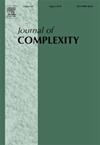Multilevel Picard approximations overcome the curse of dimensionality in the numerical approximation of general semilinear PDEs with gradient-dependent nonlinearities
IF 1.8
2区 数学
Q1 MATHEMATICS
引用次数: 0
Abstract
Neufeld and Wu (2023) [49] developed a multilevel Picard (MLP) algorithm which can approximately solve general semilinear parabolic PDEs with gradient-dependent nonlinearities, allowing also for coefficient functions of the corresponding PDE to be non-constant. By introducing a particular stochastic fixed-point equation (SFPE) motivated by the Feynman-Kac representation and the Bismut-Elworthy-Li formula and identifying the first and second component of the unique fixed-point of the SFPE with the unique viscosity solution of the PDE and its gradient, they proved convergence of their algorithm. However, it remained an open question whether the proposed MLP schema in Neufeld and Wu (2023) [49] does not suffer from the curse of dimensionality. In this paper, we prove that the MLP algorithm in Neufeld and Wu (2023) [49] indeed can overcome the curse of dimensionality, i.e. that its computational complexity only grows polynomially in the dimension and the reciprocal of the accuracy ε, under some suitable assumptions on the nonlinear part of the corresponding PDE.
多阶皮卡德近似克服了一般非线性梯度半线性偏微分方程数值逼近的维数问题
Neufeld和Wu(2023)开发了一种多电平Picard (MLP)算法,该算法可以近似求解具有梯度相关非线性的一般半线性抛物型偏微分方程,也允许相应偏微分方程的系数函数为非常数。通过引入Feynman-Kac表示和Bismut-Elworthy-Li公式驱动的特定随机不动点方程(SFPE),并利用PDE的唯一粘度解及其梯度识别SFPE唯一不动点的第一分量和第二分量,证明了算法的收敛性。然而,Neufeld和Wu(2023)提出的MLP模式是否不受维度诅咒的影响仍然是一个悬而未决的问题。在本文中,我们证明了Neufeld和Wu(2023)[49]中的MLP算法确实可以克服维数的诅咒,即在相应PDE的非线性部分的适当假设下,其计算复杂度仅在维数d∈N和精度ε的反比上多项式增长。
本文章由计算机程序翻译,如有差异,请以英文原文为准。
求助全文
约1分钟内获得全文
求助全文
来源期刊

Journal of Complexity
工程技术-计算机:理论方法
CiteScore
3.10
自引率
17.60%
发文量
57
审稿时长
>12 weeks
期刊介绍:
The multidisciplinary Journal of Complexity publishes original research papers that contain substantial mathematical results on complexity as broadly conceived. Outstanding review papers will also be published. In the area of computational complexity, the focus is on complexity over the reals, with the emphasis on lower bounds and optimal algorithms. The Journal of Complexity also publishes articles that provide major new algorithms or make important progress on upper bounds. Other models of computation, such as the Turing machine model, are also of interest. Computational complexity results in a wide variety of areas are solicited.
Areas Include:
• Approximation theory
• Biomedical computing
• Compressed computing and sensing
• Computational finance
• Computational number theory
• Computational stochastics
• Control theory
• Cryptography
• Design of experiments
• Differential equations
• Discrete problems
• Distributed and parallel computation
• High and infinite-dimensional problems
• Information-based complexity
• Inverse and ill-posed problems
• Machine learning
• Markov chain Monte Carlo
• Monte Carlo and quasi-Monte Carlo
• Multivariate integration and approximation
• Noisy data
• Nonlinear and algebraic equations
• Numerical analysis
• Operator equations
• Optimization
• Quantum computing
• Scientific computation
• Tractability of multivariate problems
• Vision and image understanding.
 求助内容:
求助内容: 应助结果提醒方式:
应助结果提醒方式:


